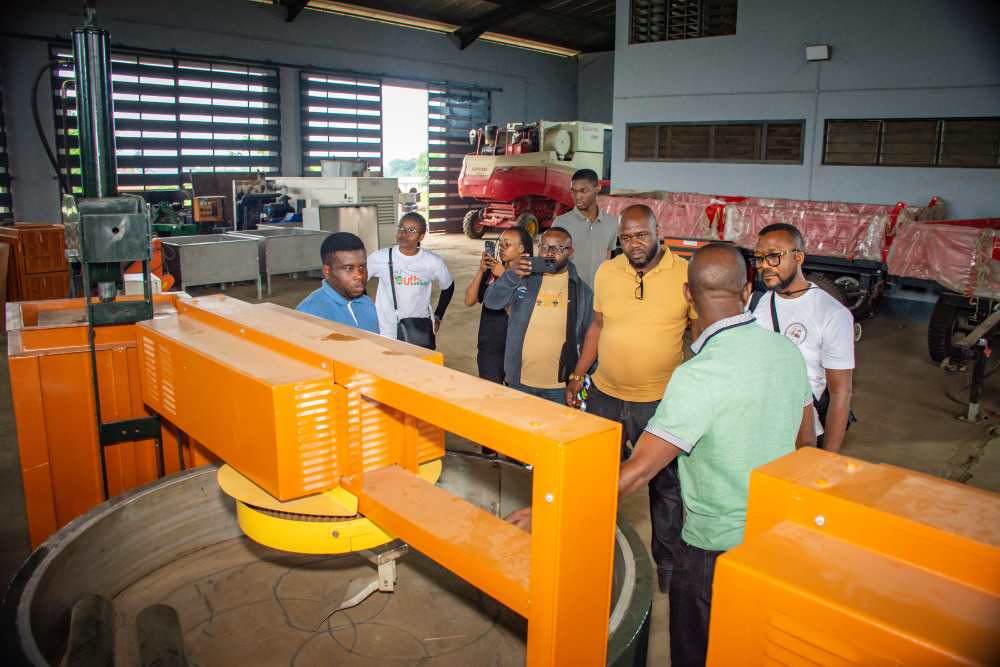Nigeria is endowed with vast agricultural land. However, many farmers still rely on using crude tools, which is a major limiting factor to productivity. This undermechanisation is also a significant bottleneck to food sufficiency and economic growth.
As the demand for food processing increases, agricultural processing has become a critical link in Nigeria’s agricultural value chain. This is where attention should be drawn to Nigeria’s locally made processing agricultural machinery. This is because they are more affordable, adaptable, and sustainable options for processors in Nigeria.
In this blog post, I’ll explain how supporting agricultural machinery development in Nigeria will unlock national potential to drive inclusive economic growth.

Challenges in Nigeria’s Agro-Processing Sector
Nigeria’s agro-processing sector is crippled because a larger percentage of the farmers and processors still depend on manual production and manual processing methods. They often use outdated tools that do not satisfy commercial or export standards.
Another significant challenge is that Nigeria’s agricultural sector relies heavily on imported machinery. Meanwhile, these machines are usually challenging for users to maintain and expensive. Therefore, smallholder farmers who constitute the larger percentage of food producers and processors cannot add quality value to their products. As a result, it has led to increased post-harvest losses.
Below are some other key challenges facing agricultural machinery in Nigeria.
- Inadequate power supply to operate machinery efficiently
- Low investment in agro-machinery development in Nigeria
- Limited government support for local machinery manufacturers
- Lack of technical skills to operate and maintain machines
- Poor market linkage and distribution infrastructure
Why Locally Made Agro-Machinery is a Game-Changer
Locally made agro-machinery in Nigeria is equipment designed, fabricated, and assembled within the country to support various stages of agricultural processing. These machines are often designed to meet the needs of local farmers in Nigeria. It usually takes into account environmental conditions and available power sources.
Locally made agro-processing machineries and equipment are often more affordable, easier to maintain, and accessible to farmers and processors. These agricultural innovations significantly reduce labour intensity and increase agricultural value chain output. Niji Lukas is a well-recognised fabricator in the Nigerian agricultural processing sector. Niji fabricates machinery for cassava processing, yielding food products such as garri, fufu, starch, and yam flour.
Below are typical examples made by Nigerian fabricators
- Cassava graters and hydraulic pressers are used in processing garri and fufu
- Palm oil expellers and oil pressers are used to extract palm oil.
- Rice de-stoners used to manage Nigeria’s parboiled rice varieties by removing stones and other impurities.
Top Benefits of Supporting Indigenous Agro-Machinery Innovation
Investing in locally made agricultural machinery in Nigeria offers numerous benefits, which will be highlighted below;
- Cost effective
- Reduced foreign exchange burden
- Cheap and quicker repairs
- Local job creation

Barriers to Scaling Made-in-Nigeria Agricultural Equipment
Scaling locally made agricultural machinery in Nigeria suffers from several roadblocks, hindering its adoption and development. These challenges are listed below.
- Inadequate research and development: There is limited government and institutional investment in research and development for agroprocessing machinery development in Nigeria.
- Limited Technical Capacity: Lack of technical know-how and formal training opportunities to equip processors on the operation of machinery.
- Low Funding: Little or no access to funding tp help scale production.
Below are some suggested solutions
- Introduction of grants and credit schemes for manufacturers.
- Establishment of research and development hubs focused on agricultural processing machinery in tertiary institutions,
- Boosting trust in made-in-Nigeria machinery.
Conclusion
The future of Nigeria’s agriculture value chain lies in innovation, accessibility, and locally made solutions. Locally made agro-machinery in Nigeria offers a powerful pathway to enhance food security, create jobs, reduce import dependency, and drive rural economic development. Organisations in Nigeria, such as Niji Group, are championing this. If you need cassava processing machines in Nigeria, such as cassava graters, a hydraulic press, a peeling machine, a pulveriser, and a garri fryer.

